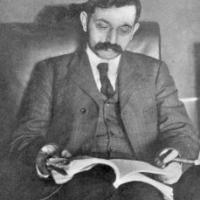
Alekhine-Lasker: The Ex-champ Gives the Future Champ A-Lickin’
Emanuel Lasker was born December 24, 1868 in Germany and died January 11, 1941 in New York. He was the World Champion for 27 years, from 1894-1921, while also being a mathematician and a philosopher. He dominated chess while champion and competed with the best for years afterwards. Three years after losing his title in to Jose R. Capablanca and three years before Capablanca lost his title to Alexander Alekhine, the three champions - past, present, and future - met in 1924 at New York. Eleven players played a double round robin which meant each had to play 20 games. Lasker scored 13 wins, 6 draws, and 1 loss to take clear first place with 16/20. Capablanca had a win and a draw against Lasker, but placed second with 10 wins, 9 draws, and one loss (14.5/20). Alekhine was third with 6 wins, 12 draws, and 2 losses (12/20).
Against Alekhine, Lasker won with Black and drew with White. His win will be shown. [To avoid confusion, notice that Alekhine had two draws with Edward Lasker, not Emanuel.] Alekhine played the Queen’s Gambit with the exchange cxd5 after developing both knights and then continued with Bf4 rather than Bg5. In this way, Alekhine was avoiding the Lasker Defense. However, he also could not play an Exchange Variation with Nge2. Lasker equalized and went on to outplay Alekhine. Lasker was accused of playing bad moves on purpose in his career. He actually made good moves as a rule, but wanted to place his opponents in problem solving situations of his choosing. Alekhine also did not always play the best moves, according to theory, especially when he was avoiding simplification. In this game Alekhine seems to be trying to attack and Lasker defends in a flexible way. In fact, Lasker played waiting moves that showed that his position did not require the most direct play at every turn. With this kind of positional understanding, Lasker was able to continue to play against top players for years after losing the title. In this 1924 game, he was 24 years older than his opponent.






